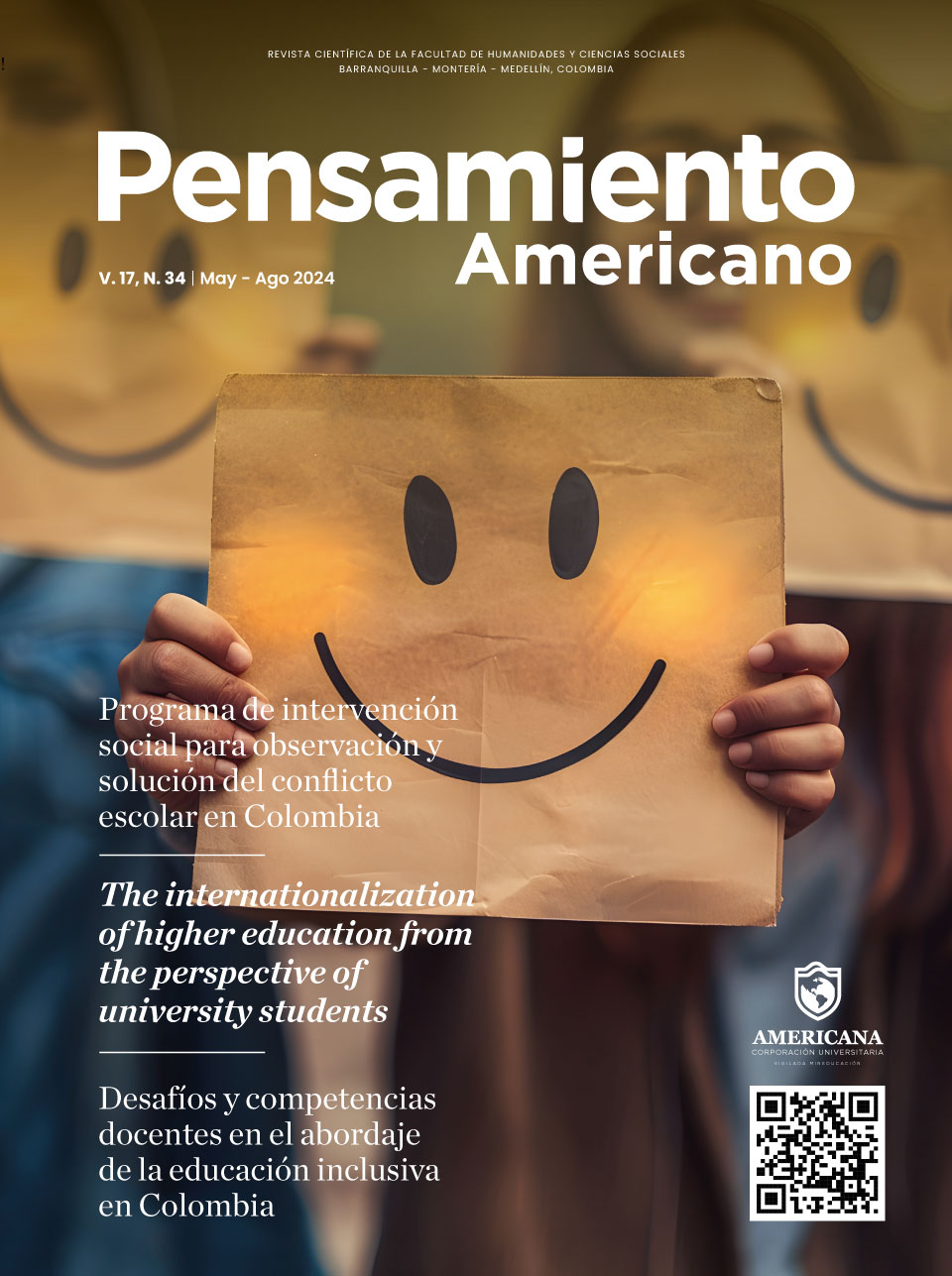Comparison of emotional intelligence and creativity levels in schooled and homeschoolers
DOI:
https://doi.org/10.21803/penamer.17.34.732Keywords:
Scholarship, Home education, Emotional intelligence, CreativityAbstract
- Introduction: The demand of today's world requires individuals who are capable of adapting, interacting and finding precise solutions for diverse circumstances regardless of their origin, or the learning style they have had access to. This is why emotional intelligence and creativity play an important role in the success of individuals. Objective: To compare the level of development of emotional intelligence and creativity in children between the ages of 8 and 10 from two different groups (schooled and homeschool). Methodology: The results obtained by the two groups of children applying the TMMS-24 Scale and the Torrance Creative Thinking Test, adapted for the Spanish language, are analyzed. Results: It is observed that school children obtain a higher level of creativity and homeschoolers children, a higher level of emotional intelligence. Conclusion: School children as well as homeschoolers have the potential to develop emotional intelligence and creativity in educational environments. It is necessary that the adults who accompany the processes more consciously promote activities and tools aimed at these areas of child development.
Downloads
References
Avalos-Obregón, M., Avalos-Obregón, M., & Cazar del Pozo, F. (2018). Homeschooling una alternativa en educación. Polo del Conocimiento, 3(10), 205-222. doi:http://dx.doi.org/10.23857/pc.v3i10.743
Bernasconi, A. y Rodríguez, E. (2017). La educación en la era del conocimento: ¿Desarrollo de capital humano o formación de personas? Interciencia, 42(10), 630. http://www.redalyc.org/articulo.oa?id=33953313001
Bisquerra, R. (2011). Educación emocional: propuestas para educadores y familias. Desclée de Brouwer, S.A.: Bilbao. Obtenido de: https://otrasvoceseneducacion.org/wp-content/uploads/2019/04/Educaci%C3%B3n-Emocional.-Propuestas-para-educadores-y-familias-Rafael-Bisquerra-Alzina-2.pdf
Bisquerra, R. y Hernández, S. (2017). Psicología positive, educación emocional y el programa Aulas felices. Papeles del psicólogo, 38(1), 58-65. Recuperado de: http://www.papelesdelpsicologo.es/pii?pii=2822
Carlson, J. F. (2020). Context and regulation of homeschooling: Issues, evidence, and assessment practices. School Psychology, 35(1), 10–19. https://doi.org/10.1037/spq0000335
Gaither M. (2017). Homeschool and American history. https://books.google.com.co/books?id=ucNCDgAAQBAJ&pg=PR6&lpg=PR6&dq=DOI+10.1057/978-1-349-95056-0&source=bl&ots=hOBXH3e5nl&sig=4r_rEhwOizfSJ3fEatcqK3tz6zU&hl=es&sa=X&ved=0ahUKEwie8pXy6__XAhWB4CYKHQgnBfIQ6AEILTAB#v=onepage&q=DOI%2010.1057%2F978-1-349-95056-0&f=false
García, A. y García, G. (2013). Filosofía de la educación: cuestiones de hoy y de siempre.
Haq, S., Asbari, M., Sukriyah, Novitasari, D., & Abadiyah, S. (2022). The Homeschooling Head Performance: How The Role of Transformational Leadership, Motivation, and Self-Efficacy? International Journal of Social and Management Studies, 3(1), 167–179. https://doi.org/10.5555/ijosmas.v3i1.96
Klimenko, O. (2015) Educar para la creatividad: un imperativo contemporáneo. En Clave Social, 4(2), 8-25.
Lara, A. (2013). Desarrollo De Habilidades De Pensamiento Y Creatividad Como Potenciadores De Aprendizaje. Revista Unimar, (59), 85-96.
Leliwa, S., Scangarello, J. I., y Ferreyra, Y. (2016). Psicología y educación (3a. ed.). Brujas: Argentina.
López-Fernández, V. y Llamas-Salguero, F. (2018). Neuropsicología del proceso creativo. Un enfoque educativo. Revista Complutense de Educación.
Marina, J. (2013). El aprendizaje de la creatividad. Pediatrìa Integral, 17(2), 138-142. Recuperado de: https://www.pediatriaintegral.es/numeros-anteriores/publicacion-2013-03/el-aprendizaje-de-la-creatividad/
Martínez, M. (2014). Educación emocional: reflexiones y ámbitos de aplicación. Recuperado de: https://ebookcentral.proquest.com
Pozas, M., Letzel, V. & Schneider, C. (2021). ‘Homeschooling in times of corona’: exploring Mexican and German primary school students’ and parents’ chances and challenges during homeschooling, European Journal of Special Needs Education, 36(1), p. 35-50, DOI: 10.1080/08856257.2021.1874152
Rodrigo, I. y Rodrigo, L. (2012). Creatividad y Educación. Prima Social (9), 311-351.
Ruiz, D., Cabello, R., Palomera, R., Extremera, N., Salguero, J., Fernández, P. (2013). Programa INTEMO. Guía para mejorar la inteligencia emocional de los adolescentes. Editorial Pirámide: Madrid, España.
Secretaría de Educación Distrital (2014). Desarrollo Socioafectivo: Educar en y para el afecto. https://issuu.com/secretariadeeducacionbogota/docs/cartilla_desarrollo_socioafectivo_w/52
UNESCO (2013). La educación transforma la vida. unesdoc.unesco.org/images/0022/002231/223115S.pdf
UNESCO (2017). Ensuring the right to equitable and inclusive quality education. Recuperado de: https://unesdoc.unesco.org/ark:/48223/pf0000251463/PDF/251463eng.pdf.multi
Wreen, M. (2015). Creativity. Philosophia, 43(3), 891–913
Downloads
Published
Versions
- 2024-08-06 (3)
- 2024-07-23 (2)
Issue
Section
License
Copyright (c) 2024 Pensamiento Americano

This work is licensed under a Creative Commons Attribution-NonCommercial-NoDerivatives 4.0 International License.
The author or authors of an article accepted for publication in the Journal Pensamiento Americano will transfer all of the patrimonial rights to the American University Corporation free of charge, within which are included: the right to edit, publish, reproduce and distribute both print media as digital, in addition to include in article in international indexes and / or databases, likewise, the Editorial Seal is authorized to use the images, tables and / or any graphic material presented in the article for the design of covers or posters from the same magazine. By assuming the patrimonial rights of the article, it may not be partially or totally reproduced in any printed or digital media without its express permission.
AUTHORITY ASPECTS
For the Pensamiento Americano Journal, all the authors of an article have made substantial contributions to the research and the manuscript, and they share the responsibility when the article presents errors, fraud in some way or violations of copyright.
After submitting an article, the journal does not accept the addition, deletion or change in the order of the authors, in addition we reserve the right to release the article when it has been submitted to the journal and under no circumstances will American Thought accept the article. withdrawal of an article during any phase of the editorial process






